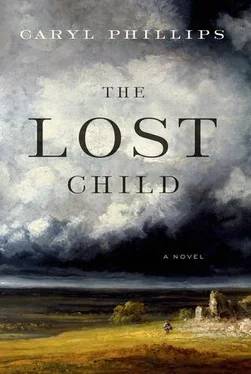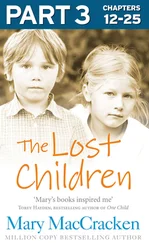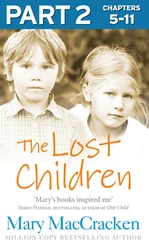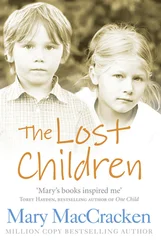“Monica’s got a job in Leeds, and she’s coming back.”
He sat down and picked up the letter and briskly read it through for any references to him, but there were none. He had assumed that his wife and daughter maintained some pattern of contact, and while he didn’t necessarily approve, it at least afforded him the opportunity to conjecture that they both still enjoyed a relationship of sorts with their only child. But out of the blue, in his hands, there was the possibility of a potential reconciliation, and he immediately convinced himself that he ought to make an effort for the sake of his wife. But Monica’s timing was awful, for the governors’ report would be his first real test, and now his wife was rushing him before the pair of them had even had the opportunity to discuss the dilemma of where to put the two boys. He turned away from the bathroom mirror and decided that at some point on the drive to the city centre he would raise the problem, although he took it somewhat for granted that Ruth would have already anticipated the quandary and prepared the back bedroom to accommodate all three of them.
He saw them huddled together on the platform like evacuees, and all that was missing were their name tags. Monica looked like a big sister who had been placed in charge of a large suitcase and her two little brothers, but as he and his wife walked towards them, he could see the exhaustion on his daughter’s harried face. Ruth stood to one side while he quickly kissed Monica’s bloodless cheek and then attempted to muss the hair of the older child, before self-consciously touching the nose of the younger one with his forefinger in the manner of a drill sergeant inspecting for dust. His daughter looked tense, as though she had arrived for a prearranged Christmas holiday already burdened with a resigned sense of obligation. He could see that his wife was holding back the tears, and he prayed that she’d continue to do so; the last thing they needed was waterworks.
He sat alone in the bedroom hunched over his desk and continued to work on his governors’ report while giving mother and daughter time to reacquaint themselves. The drive home was stressful, and if it hadn’t been for his own valiant efforts to make small talk and try to fill in some of the events of the past six years, Monica, it seemed, would have been happy to pass the time in silence. Clearly she wasn’t ready to take any responsibility for her reckless choices, and her chippy behaviour implied that she still believed that there were no consequences for the decisions you made in your life. Why did the girl always seem so intent on making him feel uneasy by steadfastly refusing to share any thoughts? He put his pen to one side and remembered that it was only after his wife had assured him that she had spoken with Monica about the birds and the bees, and that he would therefore face no ticklish questions on this front, that he tried in earnest to engage with his daughter on a wide range of subjects, including music, but she was impossible to reach. And then, sometime after her sixteenth birthday, it became apparent to him that beneath her fierce intelligence and studious determination Monica possessed a wayward, slightly ethereal streak, and he started to fear for his child and wondered if he should put her down for counselling.
As they started for home, he began to steal furtive glances at her in the rearview mirror, and he wondered if he was being hasty. Perhaps her recent experiences had finally chastened her into a new appreciation of his way of thinking, and the evidence of the transformation would become tangible only after she had recovered from the journey. However, every time he glanced up Monica was staring moodily out of the window, seemingly lost in her own dreamworld and giving away nothing. As for the two children, he had difficulty seeing who would be kind to them now that their father had completely failed to value his daughter’s affections and disowned them all and run off back to wherever it was he came from. He felt sure that at some point somebody would have to plead with his obstinate daughter to accept the introduction of the word “adoption” into her vocabulary.
Monica returned from the bathroom and took up her seat at the dining table, and he could tell she had washed her face. It even looked as though she had applied a bit of makeup, but he couldn’t be sure about this, for his wife had never stooped to cosmetics, and tarting oneself up was not sanctioned for the female teaching staff. But, painted or not, a little blush had certainly returned to his daughter’s cheeks.
“I suppose it will be different for you living back up here after all that time in the south. It might take a bit of getting used to.”
“I don’t see why. I’m from here.”
“No, well, you’re right there,” he said, eager to agree with her and avoid any guise of confrontation, although he wanted to remind Monica that it didn’t cost anything to be affable. Her letter to her mother had explained that having been successful in her application for a job as a junior librarian in a small branch library in Leeds, she had made the decision to break off with London and leave her so-called husband.
“But you’ve never worked in a library, have you?”
He saw what he assessed to be a frown starting to crease his daughter’s face, but as it grew, it revealed itself to be a look of bewilderment.
“You mean for money?”
“Well, yes.”
“No, I haven’t.” She paused. “Have you?”
“Well, not as such.”
He would have liked to have offered to help financially, but he already knew what her response would be. He also wanted to ask about this man Wilson and ascertain if he’d made any provision to send her some kind of an allowance, and suggest that if it would help her in any way, then he would happily set his solicitor on the bugger, but he elected not to trespass. Having had some smattering of conversation with her and successfully avoided the use of the phrase “begin again”—as in “so you’ll be beginning again”—he knew that he shouldn’t push his luck.
Ruth backed her way through the door with a tray laden with crockery, a teapot snug in a colourful cosy, and two packets of ginger biscuits. Monica stood up to help, and he wondered whether he ought to offer to wake up the two children, or if this was something that his daughter, or his wife, would prefer to do, so he erred on the side of caution and said nothing. As Ruth poured, he tried to determine what he would have made of this Julius Wilson now that he felt free to think about him in the past tense. But the man had never made any attempt to write and advocate for a meeting at which he might explain himself to his senior, perhaps fearing that having already walked out on one marriage, he might well find it testing to justify why he considered himself a fit and proper person to start another. And now look what the fool had gone and done: he’d abandoned his only child with this permanent stain on her reputation.
His wife began to admit how much she missed the old terraced house and her few friends, while careful to point out all the modern conveniences of the new semi and stress the fact that there were plans afoot for a whole row of shops to be built on an undeveloped parcel of land to the back of them.
“Eventually the number twenty-four and twenty-six routes will be extended so that we’re the terminus, but they’ve not said when.”
She could feel her husband closely scrutinizing her, and she began to feel oafish in herself. However, Ruth knew that there was still plenty of time before she would be collecting her pension, although she had to admit that she sometimes looked, and even acted, like a lady whose Tuesday mornings were spent lining up at the post office to get her book stamped. Her hair had turned prematurely grey a decade ago, but rather than colour it, or at the very least have it cut into a borrowed style that might change the shape of her face, she had begun instead to bunch it on top of her head and hold the hysterical tangle in place with an assemblage of carefully placed hairpins. She imagined it was her ever-ripening plumpness that was causing both a little arthritic slowness and shooting pains in her feet and ankles, so much so that these days she wore only carpet slippers, and had even bought a pair for outdoor use, but her husband had drawn the line at this vulgarity. She didn’t argue, but that was pretty much how she had managed to maintain what she assumed was a tolerable marriage, by not arguing and locking away all her talk inside of herself.
Читать дальше












